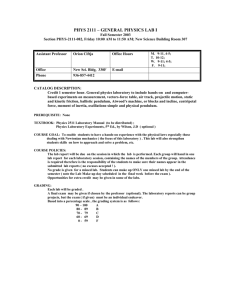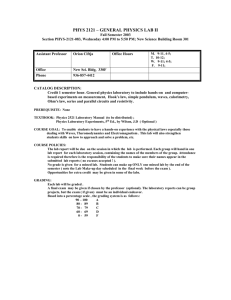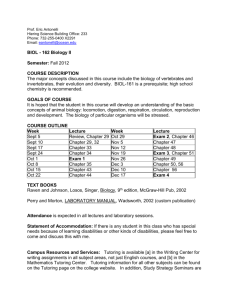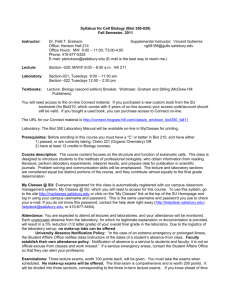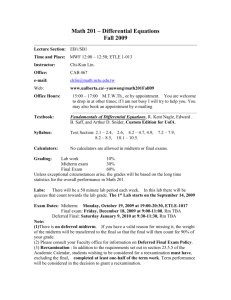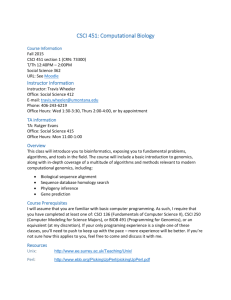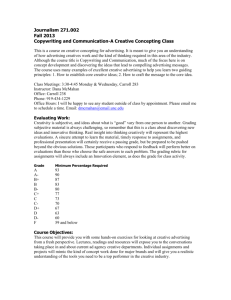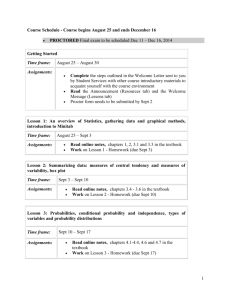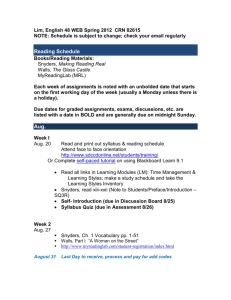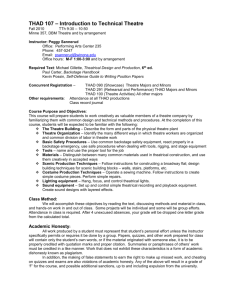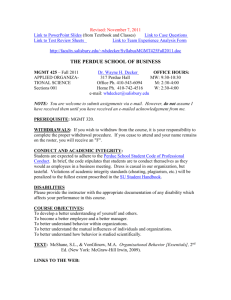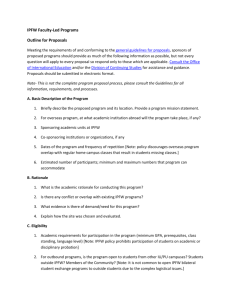Course Syllabus PSY 203-01
advertisement
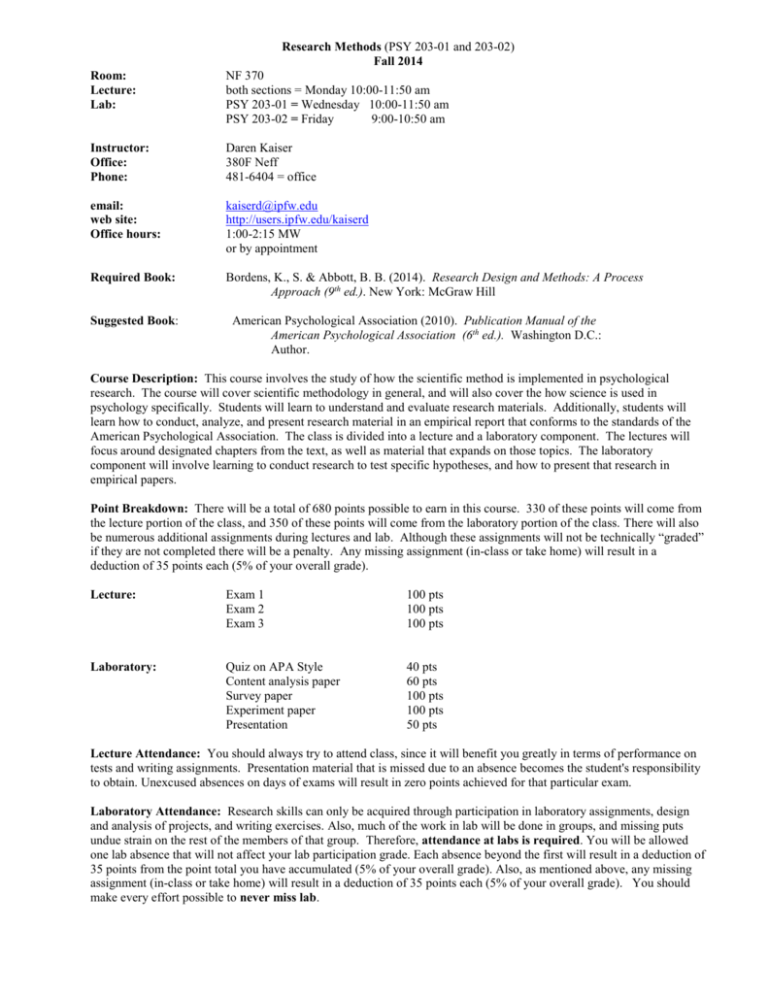
Research Methods (PSY 203-01 and 203-02) Fall 2014 Room: Lecture: Lab: NF 370 both sections = Monday 10:00-11:50 am PSY 203-01 = Wednesday 10:00-11:50 am PSY 203-02 = Friday 9:00-10:50 am Instructor: Office: Phone: Daren Kaiser 380F Neff 481-6404 = office email: web site: Office hours: kaiserd@ipfw.edu http://users.ipfw.edu/kaiserd 1:00-2:15 MW or by appointment Required Book: Bordens, K., S. & Abbott, B. B. (2014). Research Design and Methods: A Process Approach (9th ed.). New York: McGraw Hill Suggested Book: American Psychological Association (2010). Publication Manual of the American Psychological Association (6th ed.). Washington D.C.: Author. Course Description: This course involves the study of how the scientific method is implemented in psychological research. The course will cover scientific methodology in general, and will also cover the how science is used in psychology specifically. Students will learn to understand and evaluate research materials. Additionally, students will learn how to conduct, analyze, and present research material in an empirical report that conforms to the standards of the American Psychological Association. The class is divided into a lecture and a laboratory component. The lectures will focus around designated chapters from the text, as well as material that expands on those topics. The laboratory component will involve learning to conduct research to test specific hypotheses, and how to present that research in empirical papers. Point Breakdown: There will be a total of 680 points possible to earn in this course. 330 of these points will come from the lecture portion of the class, and 350 of these points will come from the laboratory portion of the class. There will also be numerous additional assignments during lectures and lab. Although these assignments will not be technically “graded” if they are not completed there will be a penalty. Any missing assignment (in-class or take home) will result in a deduction of 35 points each (5% of your overall grade). Lecture: Exam 1 Exam 2 Exam 3 100 pts 100 pts 100 pts Laboratory: Quiz on APA Style Content analysis paper Survey paper Experiment paper Presentation 40 pts 60 pts 100 pts 100 pts 50 pts Lecture Attendance: You should always try to attend class, since it will benefit you greatly in terms of performance on tests and writing assignments. Presentation material that is missed due to an absence becomes the student's responsibility to obtain. Unexcused absences on days of exams will result in zero points achieved for that particular exam. Laboratory Attendance: Research skills can only be acquired through participation in laboratory assignments, design and analysis of projects, and writing exercises. Also, much of the work in lab will be done in groups, and missing puts undue strain on the rest of the members of that group. Therefore, attendance at labs is required. You will be allowed one lab absence that will not affect your lab participation grade. Each absence beyond the first will result in a deduction of 35 points from the point total you have accumulated (5% of your overall grade). Also, as mentioned above, any missing assignment (in-class or take home) will result in a deduction of 35 points each (5% of your overall grade). You should make every effort possible to never miss lab. Course Grading: Your course grade will depend on the total amount of points you accumulate during the semester (minus any deductions for missed labs or assignments) divided by the total amount of points possible (650). 89.5%-100% = A 79.5%-89.4% = B 69.5%-79.4% = C 59.5%-69.4% = D 0%-59.4% =F General Information: If you have a disability or acquire one, contact Services for Students with Disabilities (Walb 113, 481-6657) for the services and accommodations that are available at IPFW. CASA (Center for Academic Support and Advancement), KT G21 Writing Center, KT G19 Dean of Students Office, Walb 111 Multicultural Services, Walb 118 Academic Counseling and Career Services (ACCS), KT 109 Tentative Lecture Schedule – Mondays Aug 25 Introduction , syllabus, ways of knowing Sept 1 No Class Sept 8 Non experimental designs Sept 15 Correlational designs Sept 22 Quasi experimental designs Sept 29 Exam 1 Oct 6 Ethics: Informed consent, deception, debriefing etc. Oct 13 No Class Oct 20 The basics of experimentation Oct 27 The basics of experimentation Nov 3 Between subjects designs Nov 10 Exam 2 Nov 17 Between subjects factorial designs Nov 24 Between subjects factorial designs Dec 1 within subjects designs Dec 8 Small N + Controlling Extraneous variables Dec 17 Exam 3 = During Final Exam period (Wednesday) . chapter 1 chapters 8 + 9 chapter 4 chapter 11 chapter 7 chapters 4 + 5 chapters 4 + 5 chapter 10 chapter 10 chapter 10 chapter 10 chapters 12, 5 and 6 8:00-9:50 am Tentative Lab Schedule - Wednesdays and Fridays Due Dates for Assignments LAB 1 - Aug 27 and 29 APA style lecture LAB 2 – Sept 3 and 5 Content analysis article must be read Quiz on APA Style prior to class and brought to lab LAB 3 - Sept 10 and 12 content analysis project LAB 4 - Sept 17 and 19 content analysis project LAB 5 - Sept 24 and 26 content analysis project LAB 6 – Oct 1 and 3 Survey Project Content Analysis paper due LAB 7 - Oct 8 and 10 Survey Project LAB 8 - Oct 15 and 17 Survey Project LAB 9 - Oct 22 and 24 Survey Project LAB 10 - Oct 29 and 31 Experiment Project Survey paper due LAB 11 – Nov 5 and 7 Experiment Project LAB 12 - Nov 12 and 14 Experiment Project LAB 13 - Nov 19 and 21 Experiment Project Nov 26 and 28 No Class LAB 14 - Dec 3 and 5 Experiment Project LAB 15 - Dec 10 and 12 Presentations Experimental Paper Due




